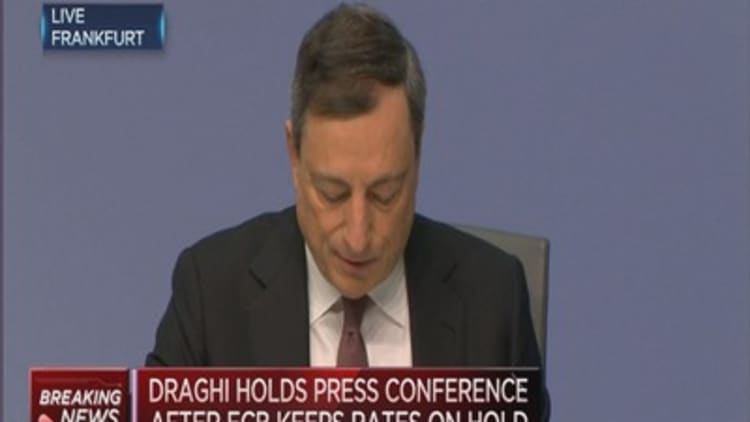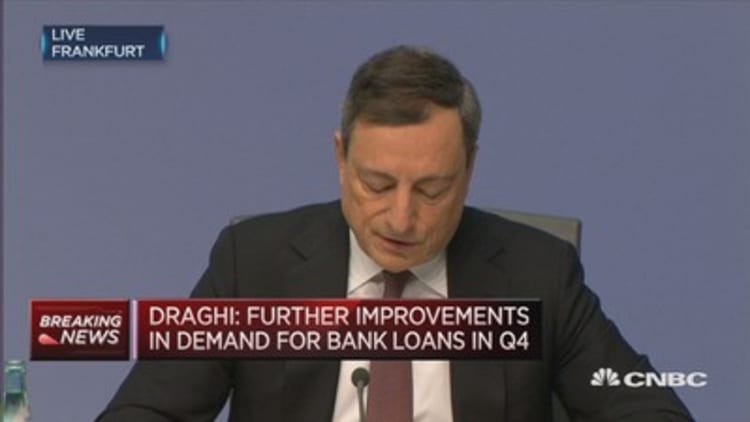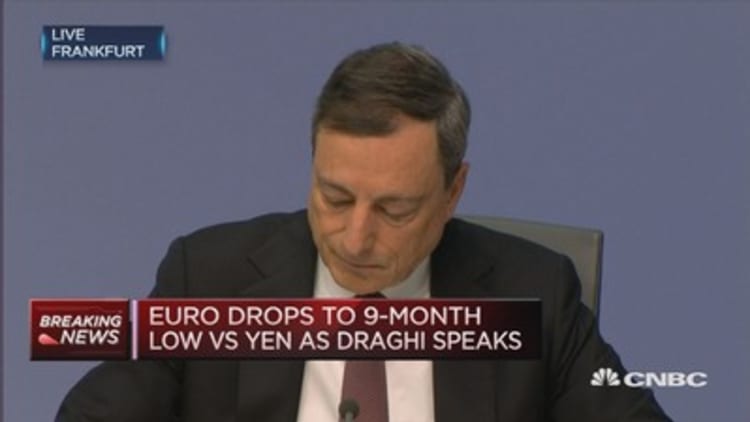


European Central Bank President Mario Draghi on Thursday signaled the bank could further ease its monetary policy as early as March amid growing concerns over faltering global economic growth which have caused huge volatility in financial markets.
The bank left interest rates on hold on Thursday. No new policy changes had been anticipated this meeting of the bank's monetary policy committee, but analysts had predicted that recent market volatility could have forced the bank's hand to provide more policy support in the not-too-distant future.
ECB President Mario Draghi told reporters at a press conference that downside risks had increased at the start of the year. "It will therefore be necessary to review and possibly reconsider our monetary policy stance at our next meeting in March."
The euro fell against the dollar following the comments, dropping below $1.08 for the first time in two weeks, while European stocks turned higher.
"What was expected to be a dull first meeting of the year, turned out to be an exciting ECB meeting with ECB president Mario Draghi opening the door widely for new ECB action in March. While today's ECB meeting will again feed bold speculations about what could happen in March, the question remains whether Draghi will really be able to deliver on his promise," Carsten Brzeski, senior economist at ING DiBA said.
At its previous meeting in December the bank said it was widening the range of its trillion-euro bond-buying program and extending the duration of the program to March 2017 (and possibly beyond). It also cut the deposit rate further into negative territory.
Draghi said the measures the bank announced in December were "significant", but circumstances had changed since then.
The credibility of the ECB would be harmed by not reviewing its policy stance in March, he said, adding there was "no limit" to action within its mandate.
Draghi said the decision to signal a policy review had been unanimous.
The meeting comes as European stocks closed at their lowest level since 2014 on Wednesday, and have tumbled over 9 percent so far this year as concerns surrounding global growth, uncertainty in China and fresh lows in oil prices continue to grip markets.
Draghi said the Chinese had acted responsibly and were gaining control over policy making. On the slide in oil prices, Draghi said that the governing council had looked at the magnitude of the drop in oil prices - 40 percent since its last meeting - and concluded that it posed a risk to inflation.
"We have to take seriously the fact that low oil prices..for a long period of time may actually have second round effects that we definitely want to take action against."
As well as the slump in equity markets, inflation expectations have also fallen, credit spreads have risen, and the euro has strengthened against some major currencies. None of which are likely to put the ECB at ease.
"Events of the past six weeks have certainly increased the chances of the ECB eventually providing more policy support. The plunge in the oil price to below $30 per barrel means that CPI inflation could average as little as 0.2 percent this year – well below the ECB's current forecast of 1 percent. Meanwhile, news from China has added to concerns that industrial and export weakness in the euro zone may well persist into 2016," said lead euro zone economist at Oxford Economics, Ben May.
Banking concerns
On top of the turmoil caused by concerns over China and commodity prices, the Italian banking sector has given investors cause for alarm in recent days.
The Italian banking index has seen sharp falls, led down by lender Monte dei Paschi di Siena amid concerns over its bad loans.
Draghi said Italian banks had an "average" level of provisions similar to other euro area banks.
Meanwhile Jeroen Dijsselbloem, president of the Eurogroup, told CNBC that Europe's banking sector was strong despite high levels of indebtedness in the sector.
"The new system is working and the new rules and requirements are a lot tougher than they used to be. A lot of work has been done in European banks at the end of the AQR (the asset quality review or stress testing of banks by the European Central Bank). New capital was brought in and losses were taken but the clean-up continues."
He warned however that there are still "quite strong portfolios of non-performing loans throughout Europe that need to be dealt with."



